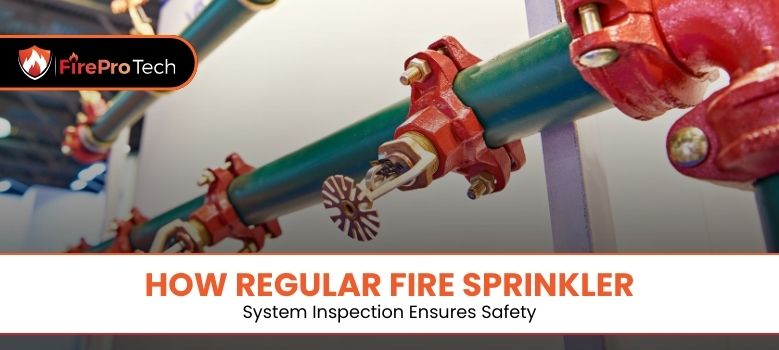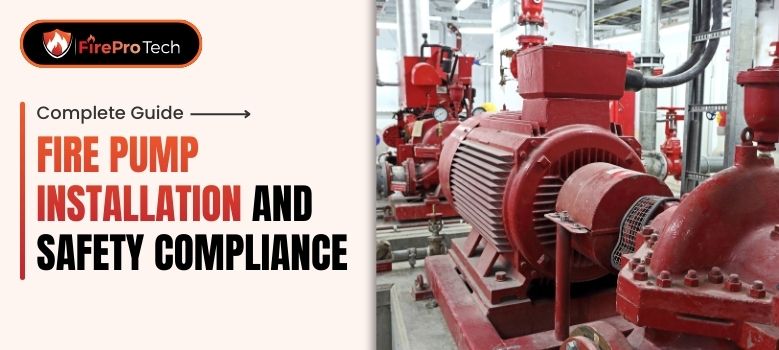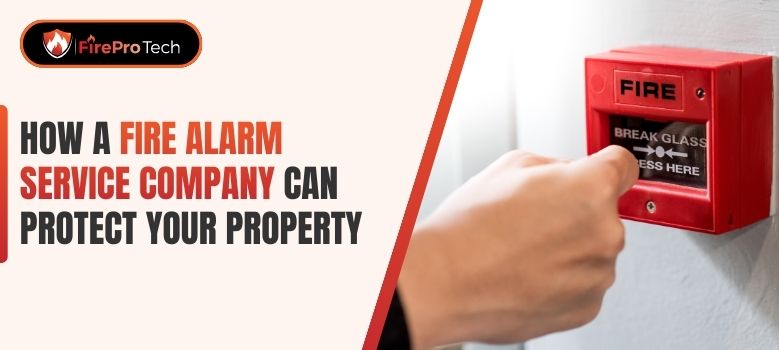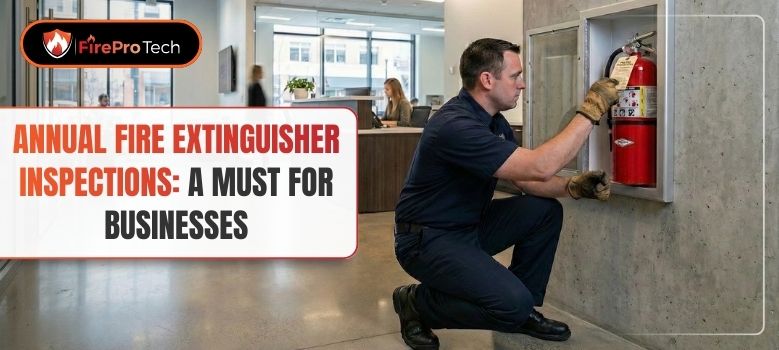
A fire sprinkler system inspection is one of the most important steps any property owner or manager can take to ensure safety and compliance. These inspections are not just a legal requirement; they are a frontline defense against potential fire emergencies. By confirming that every part of the system is working as designed, inspections give you confidence that your building and its occupants are protected at all times.
Think of it this way: a fire sprinkler system is only as reliable as its last fire sprinkler system inspection. Without regular evaluations, hidden issues such as corroded pipes, blocked sprinkler heads, or malfunctioning valves may go unnoticed until it’s too late. In a fire emergency, those failures could mean the difference between swift suppression and devastating loss.
This is where FirePro Tech, LLC steps in. With experienced technicians and a commitment to safety, the company ensures that each inspection meets rigorous standards while being easy for clients to manage. By partnering with a trusted provider, you not only satisfy code requirements but also safeguard your investment, your people, and your peace of mind.
At its core, a fire sprinkler system inspection is a detailed evaluation of your sprinkler system’s components, designed to confirm that everything functions correctly. This includes visual checks, functional testing, and a thorough review of all devices connected to the sprinkler network. From risers to sprinkler heads, every piece is examined to verify compliance with industry standards like NFPA 25, which governs inspection, testing, and maintenance schedules.
Unlike casual maintenance checks, these inspections are systematic and documented. They provide a clear record of system condition, highlight any deficiencies, and establish proof of compliance for authorities having jurisdiction. That record can become a critical resource if questions ever arise about your building’s safety readiness.
The purpose of a fire sprinkler system inspection extends far beyond code compliance. These inspections help identify issues before they escalate into serious hazards. For instance, a corroded pipe may seem minor, but left unchecked, it can block water flow during a fire event. Similarly, a misaligned sprinkler head could prevent adequate water distribution in critical areas, putting lives and property at risk.
Regular inspections also preserve system reliability. A sprinkler system that goes untested may technically exist in the building, but in an emergency, its effectiveness could be compromised. Consistent oversight ensures that when the system is needed, it activates properly and does its job without hesitation.
In addition to protecting lives, inspections shield property owners and managers from liability. Insurance providers often require proof of ongoing inspections to maintain coverage, and failing to provide documentation could delay or even deny a claim. Beyond that, courts may view skipped inspections as negligence if a fire occurs and the system fails.
By scheduling consistent fire sprinkler system inspections with a qualified partner like FirePro Tech, LLC, you ensure that your system performs when it matters most. You also gain peace of mind knowing you’ve taken every reasonable step to safeguard your building, your people, and your financial interests.
Protect Lives—Book a Sprinkler Inspection Now!
Regular scheduling is at the heart of every effective fire sprinkler system inspection. National Fire Protection Association (NFPA) 25 guidelines set the cadence for weekly, monthly, quarterly, annual, and five-year evaluations. Each interval has its own purpose, and together they ensure that a system stays ready for emergencies without gaps in protection.
Some checks occur as frequently as once a week or once a month. These tasks include verifying control valves are locked, sealed, and in the open position. In addition, pressure gauges may be reviewed to confirm that water supply is stable. Even though these checks appear simple, skipping them during a fire sprinkler system inspection can allow hidden issues like tampering or unnoticed water loss to grow into larger threats.
Quarterly and annual intervals involve a more thorough fire sprinkler system inspection. This is where components such as alarm devices, waterflow switches, and system valves are tested for function. These inspections also confirm that sprinkler heads remain unobstructed and properly aligned. At the annual level, the process grows even more comprehensive, with a detailed review of every major system element, making fire sprinkler testing a natural part of the process.
Every five years, NFPA requires a deeper evaluation that goes beyond standard testing. This fire sprinkler system inspection involves internal pipe assessments to identify corrosion, buildup, or obstructions that could restrict water flow. Fire department connections and check valves are also taken apart and tested to confirm that they will work under pressure. These steps often reveal issues that cannot be seen during shorter-interval inspections.
One of the biggest challenges property managers face is fitting inspections into daily operations without interrupting business. Partnering with FirePro Tech, LLC makes that process seamless. The team works with clients to arrange convenient scheduling, including after-hours visits if needed. This ensures that inspections remain consistent while day-to-day operations continue uninterrupted.
A fire sprinkler system inspection is not a quick glance at equipment. It is a structured process that examines each part of the system to verify safety and readiness. From the main riser to the most remote sprinkler head, technicians carefully review components to confirm compliance and reliability.
Valves are the gateways that control water flow, and they are among the most important features in a sprinkler system. Inspectors verify during a fire sprinkler system inspection that valves are in the correct position, are properly sealed or supervised, and are free of leaks. A closed or damaged valve can render an entire system ineffective, which makes these checks critical.
Pressure gauges provide early warning of system irregularities, while alarm devices alert occupants and first responders during activation. During an inspection, gauges are compared to expected readings, and alarms are tested for functionality. These steps ensure that when the system is triggered, both water pressure and notifications operate as intended.
Another part of every fire sprinkler system inspection is the review of waterflow switches. These devices detect movement of water in the pipes when a sprinkler head opens. By testing switches, inspectors confirm that the system will send timely alerts when activated, providing both occupants and Fire monitoring services with immediate warning.
Inspectors also walk through the building to look at visible piping and sprinkler heads. They search for signs of corrosion, leaks, or physical damage, as well as obstructions like paint, dust, or furniture blocking coverage. A building fire sprinkler system inspection at this stage ensures that every part of the property is included in the safety review, not just the main mechanical room.
Many properties use more than one type of fire protection equipment, such as suppression systems for kitchens, server rooms, or hazardous storage. In those environments, a fire sprinkler system inspection is often coordinated with a fire suppression system inspection. This integrated approach ensures that all systems work together, providing uninterrupted coverage in areas where fire risks vary.
FirePro Tech, LLC excels in providing this comprehensive approach. By combining inspections into a single service plan, clients save time, simplify documentation, and ensure that every protection measure in their facility works seamlessly.
Get Peace of Mind—Inspect Fire Sprinklers Today!
A routine fire sprinkler system inspection is essential, but every five years, regulations call for a more detailed internal assessment. This evaluation is designed to uncover hidden risks inside the system that cannot be identified through surface checks alone. By going deeper, inspectors ensure that the system is capable of performing under the most demanding conditions.
Over time, sprinkler piping can accumulate sediment, rust, or biological growth that reduces water flow. An obstruction investigation examines the interior of the pipes to confirm that water can move freely when the system is activated. If buildup is discovered, corrective action such as flushing or pipe replacement may be required to restore functionality.
Check valves play a critical role in preventing backflow and maintaining system integrity. During the five-year fire sprinkler system inspection, these valves are removed, inspected, and tested to confirm they are operating properly. Any wear, corrosion, or sticking can compromise reliability, so this step ensures that water moves in the correct direction during an emergency.
Another major element of the five-year review is main drain testing, which measures how quickly and effectively water flows through the system. Flow rates are compared against original design standards to ensure nothing has changed. In some cases, reduced flow may indicate a hidden blockage or valve malfunction that needs to be corrected immediately. In this way, fire sprinkler system testing and inspection work hand in hand to confirm that every component meets performance expectations.
Fire department connections (FDCs) are also evaluated in this cycle. These fittings allow firefighters to supplement the system with additional water and pressure during a major fire event. If caps are missing or connections are clogged, valuable time can be lost. Regular testing of FDCs as part of a fire sprinkler system inspection confirms that responders can use them without delay.
This deeper evaluation provides peace of mind by identifying issues before they escalate into system failure. By investing in a complete fire sprinkler system inspection at the five-year mark, property owners avoid costly emergencies and maintain compliance. FirePro Tech, LLC specializes in performing these assessments with precision, ensuring every component is thoroughly tested and documented.
Every fire sprinkler system inspection produces more than just observations—it creates a record of compliance that property owners can rely on. Proper documentation not only satisfies code requirements but also helps with insurance, legal protection, and long-term planning for system maintenance.
Inspection tags are placed on sprinkler risers or other visible points after an inspection is completed. These tags display critical details such as the date, inspector name, and next scheduled service. They act as quick visual proof for authorities that the system has been checked according to required standards. A missing or outdated tag can raise concerns during compliance audits.
Beyond tags, a full inspection report provides a written record of system conditions. Reports outline what was tested, what deficiencies were found, and what recommendations are being made. This record serves as evidence of due diligence, helping property managers show they have taken all necessary steps to maintain fire safety.
Not all problems carry the same weight. During a fire sprinkler system inspection, deficiencies are categorized to clarify urgency. Impairments are serious issues that could prevent the system from functioning, such as closed valves or inoperative alarms. Minor deficiencies may involve cosmetic damage or less critical wear but should still be addressed to maintain long-term reliability.
Resolving deficiencies is just as important as identifying them. FirePro Tech, LLC works closely with property owners to correct issues quickly and efficiently. Once repairs are complete, retesting ensures the system is restored to full compliance. This approach minimizes downtime while maintaining high standards of safety.
Keeping accurate inspection records builds a history of system performance and service. This history can be invaluable during insurance claims, audits, or future renovations. By maintaining consistent documentation, property owners demonstrate accountability and safeguard themselves against liability. Partnering with FirePro Tech, LLC ensures that these records are organized, clear, and readily available when needed.
Many property managers and owners ask what drives the cost of a fire sprinkler system inspection. The truth is that pricing is influenced by several key variables, and understanding these helps set realistic expectations. While safety and compliance should always be the top priorities, planning for costs in advance ensures inspections remain consistent and stress-free.
One of the biggest factors in determining cost is the size and complexity of the system. A small residential property may only require a brief inspection, while a large commercial facility with multiple floors, risers, and specialized areas will take more time and resources. The greater the scope, the more detailed the inspection becomes, which directly impacts pricing.
Accessibility also plays a major role. If valves, piping, or sprinkler heads are difficult to reach, inspections require more time and effort. In addition, if the system has not been properly maintained in the past, inspectors may uncover multiple deficiencies that extend the process. A well-maintained system often leads to smoother inspections and lower long-term costs.
Homeowners benefit from having sprinkler systems in place, but they should also budget for regular inspections. Residential fire sprinkler system inspection cost is usually lower than that of commercial properties due to smaller system sizes. However, costs can rise if inspectors identify hidden issues such as corrosion or outdated components that require replacement. For homeowners, this investment ensures that protection for family and property is always reliable.
Many properties have multiple fire protection systems, including alarms, extinguishers, and suppression systems. When inspections for these are scheduled together, the overall expense can often be reduced. FirePro Tech, LLC offers bundled service plans that simplify compliance and help property managers save money without compromising quality.
While cost is a consideration, it is important to view inspections as a long-term investment. The expense of a single inspection is minimal compared to the financial impact of property damage, liability claims, or insurance disputes that follow a system failure. Regular fire sprinkler system inspection ensures consistent reliability and provides lasting peace of mind.
A fire sprinkler system inspection is not only about protecting lives and property—it also plays a critical role in reducing liability and securing insurance coverage. When inspections are missed or records are incomplete, owners and managers may face serious financial consequences.
Insurance providers often require documented proof that inspections are performed on schedule. If a fire occurs and records show that inspections were skipped, coverage could be delayed or denied altogether. In contrast, maintaining complete documentation demonstrates due diligence and helps claims move forward quickly.
Property owners also carry legal responsibility for ensuring that fire protection systems are functional. If a fire results in injury or damage and an investigation reveals that inspections were neglected, courts may view this as negligence. The financial impact of lawsuits can far exceed the modest cost of regular inspections, making compliance essential.
Inspections also protect business continuity. A malfunctioning system can lead to shutdowns, tenant complaints, or occupancy restrictions until deficiencies are corrected. By scheduling regular fire sprinkler system inspection services, businesses avoid costly disruptions and maintain trust with employees, tenants, and customers.
When you partner with FirePro Tech, LLC, you gain more than inspection services—you gain a proactive strategy to reduce risk and liability. With clear reporting, timely corrections, and thorough documentation, the company ensures that both safety and compliance standards are met. This approach not only satisfies insurers and regulators but also provides lasting confidence that your facility is fully protected.
Choosing the right partner for a fire sprinkler system inspection makes a significant difference in both safety and compliance. FirePro Tech, LLC approaches each inspection with a balance of technical precision and client-focused service, ensuring every detail is managed from start to finish.
Every inspection is performed by highly trained technicians who are certified to meet industry standards. Their expertise allows them to identify even subtle deficiencies that could compromise system performance. With ongoing training, technicians stay updated on code changes, ensuring inspections remain aligned with the latest requirements.
Accurate testing requires more than experience—it requires the right equipment. FirePro Tech, LLC uses calibrated tools to measure system performance with precision. Safety is also prioritized at every step, with technicians following strict protocols to protect both building occupants and the property itself during the inspection process.
One of the hallmarks of a professional fire sprinkler system inspection is clear communication. FirePro Tech, LLC delivers reports with photos, time-stamped notes, and straightforward explanations of findings. This transparency eliminates guesswork and helps property owners make informed decisions quickly.
Inspections are not limited to compliance—they also provide insights into preventive care. FirePro Tech, LLC technicians offer recommendations that extend the lifespan of sprinkler systems, reduce future repair costs, and enhance reliability. This proactive approach ensures property owners gain more value from every inspection.
Not every sprinkler system is the same, and each requires a unique approach during a fire sprinkler system inspection. The type of system in place determines what inspectors look for, how they test performance, and what preventive actions they recommend.
Wet sprinkler systems are the most common, with water always present in the pipes. Inspectors check for leaks, corrosion, and temperature concerns that could affect water pressure. In colder climates or areas prone to freezing, special attention is paid to spaces that may not be adequately heated.
Dry systems, which use pressurized air instead of water in the pipes until activation, require additional testing. Inspectors confirm during a fire sprinkler system inspection that the air pressure is stable and that valves release water quickly when needed. They also check for condensation buildup, which can lead to corrosion inside the piping.
Specialty systems like pre-action and deluge configurations include more complex controls and detection devices. During an inspection, these systems require sequence testing to ensure all components activate in the correct order. FirePro Tech, LLC technicians carefully verify these details to confirm that systems respond as designed under emergency conditions.
Large facilities with multiple systems present another layer of complexity. Inspectors must coordinate reviews across different structures to maintain consistency and compliance. FirePro Tech, LLC excels in managing these large-scale inspections, ensuring that every building remains properly documented and protected without disrupting overall operations.
A fire sprinkler system inspection runs most smoothly when building managers prepare in advance. Proper preparation reduces downtime, ensures technicians can complete their work efficiently, and helps identify potential issues before the inspection even begins.
One of the most common challenges is providing access to all areas where sprinkler equipment is installed. Valves, risers, and sprinkler heads may be located in secure or restricted spaces. Arranging escorts or access credentials ahead of time allows inspections to proceed without delays.
Some facilities cannot afford interruptions during business hours. FirePro Tech, LLC accommodates these needs by offering after-hours and weekend scheduling. This flexibility allows a fire sprinkler system inspection to be completed without affecting tenants, employees, or customers.
Simple steps such as clearing storage away from sprinkler heads, verifying that valves are visible, and checking that mechanical rooms are unlocked can make a significant difference. These small measures help technicians complete their work faster and provide a clearer picture of system condition.
The most important part of preparation is consistency. Scheduling inspections on time ensures compliance and avoids unnecessary risk. FirePro Tech, LLC helps clients by tracking schedules and sending reminders so inspections never fall behind. This proactive support keeps properties safe and compliant year after year.
A consistent fire sprinkler system inspection is far more than a box to check for compliance. It is the backbone of fire safety, ensuring that your system will respond instantly and effectively when it is needed most. By committing to scheduled inspections, property owners and managers reduce risks, safeguard lives, and protect investments from unnecessary losses.
Partnering with FirePro Tech, LLC provides the assurance that inspections are completed thoroughly, documented properly, and handled with care. From residential properties to large commercial complexes, every inspection is tailored to the specific system in place. This personalized approach guarantees that no detail is overlooked and that every facility remains both compliant and prepared.
Ultimately, fire protection is not about reacting after disaster strikes—it is about staying ahead with proactive measures. A professional fire sprinkler system inspection is one of the most reliable ways to do exactly that. With FirePro Tech, LLC by your side, you can be confident that your property is not only compliant but also truly safe.
A fire sprinkler system inspection schedule is determined by NFPA 25 guidelines and local authority requirements. Typically, inspections are required on weekly, monthly, quarterly, annual, and five-year cycles. Each interval serves a different purpose, from quick valve checks to detailed system evaluations. Partnering with FirePro Tech, LLC ensures inspections are always completed on time, keeping your facility compliant and your system reliable.
A fire sprinkler inspection includes a full review of valves, gauges, alarms, waterflow switches, visible piping, and sprinkler heads. Inspectors confirm proper function, alignment, and readiness for emergency activation. Comprehensive reports are provided to document findings and recommend corrections. FirePro Tech, LLC delivers this process with transparency and precision, ensuring every detail of your system is reviewed.
An inspection is a visual and functional evaluation of the system, while testing involves activating or simulating activation of components to verify performance. Both are required to ensure full compliance and reliability. Fire sprinkler system inspection is often paired with testing to create a complete review, and FirePro Tech, LLC handles both processes seamlessly for its clients.
A five-year fire sprinkler inspection involves a detailed internal assessment of system components such as piping, check valves, and fire department connections. This level of inspection uncovers hidden issues like corrosion or obstructions that standard checks cannot detect. FirePro Tech, LLC specializes in performing these thorough reviews, giving property owners peace of mind that every element is fully functional.
Residential fire sprinkler system inspection cost varies depending on system size, accessibility, and condition. Smaller homes typically cost less, but expenses may rise if repairs or updates are needed. Investing in regular inspections with FirePro Tech, LLC ensures safety for your family while keeping long-term costs manageable.
Only trained and certified technicians are qualified to perform inspections. These professionals understand code requirements, system mechanics, and safety protocols. FirePro Tech, LLC employs highly trained inspectors who are equipped with the tools and knowledge to deliver accurate and compliant inspections every time.
If an inspection reveals deficiencies, the system is considered out of compliance until corrections are made. Depending on the severity, issues may require immediate repair or scheduled maintenance. FirePro Tech, LLC not only identifies deficiencies but also provides corrective solutions and retesting, ensuring the system is quickly restored to full functionality and compliance.

Fire pump installation is essential to effective fire protection in Houston, providing the water pressure...

Every property owner recognizes that safety, especially fire safety, is a top priority. Fires can...

Fire safety remains a top concern for businesses in Houston and its neighboring areas, especially...